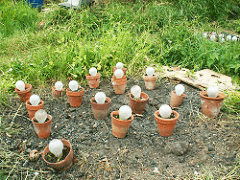
Because of the foundation's interactions with the organization, they reached out to Fahe to fund a larger initiative they were interested in, but sadly, it still didn’t reach the organization. The grant was for a very specific purpose that the organization didn't have the capacity for, and thus couldn't work with. Operating in one of the most economically challenged counties in the country, $25,000 in operational support would have had an impact on the organization's work.
Foundations spark social change by supporting the “next big idea.” It’s critically important for philanthropy to push our work forward by supporting big, audacious goals because they help provide a catalyst for innovation and new collaborations that bring about real change. However, as nonprofits and funders, we need to make sure we’re not only pushing the “next big idea,” but supporting day-to-day growth in capacity and scale.
Funding for “big ideas” often comes with a large slug of cash as its incentive. While such a windfall sounds amazing on the surface, it’s only truly beneficial if community organizations have the capacity to handle large sums of cash all at once. There’s a lot of risk associated with the opportunity, and there are quite a few organizations that will have to take a pass because they don’t have room for any margin of error. For many of our rural nonprofits and groups that function in other areas of persistent poverty, the mismanagement of a large amount of funds can result in being forced to close, creating a vacuum of need that will take years to fill, if at all.
It’s important for us to consider the unseen work that’s happening each and every day alongside the next big idea—the daily tasks that set the groundwork for groups to become better positioned to champion new causes.
We can’t let the pursuit of the new come at the cost of good work that doesn’t feel game changing. If nonprofits are struggling from pay cycle to pay cycle to perform their work, they won’t have the capacity to generate the next big idea, even if they are in a region of the country that would benefit greatly from the initiative. A community or organization that has been underfunded needs a steady stream of income that allows them to build their capacity before they can work with large sums of cash.
So, what if the philanthropic community simultaneously made investments for new causes while making investments toward operating costs in communities that aren’t ready but will be in time? By investing smaller chunks over long periods of time, foundations can provide communities with access to the things they really need: affordable housing, jobs, education, and improved infrastructure. By helping to lay this groundwork, they are ensuring the creation of a larger net that will provide the resources for the next big idea.
While it may take time for these groups to position themselves to accept larger sums, as regional intermediaries, we are happy to help get them there. We have members in our network who are ready to move forward with large initiatives, and we have some who aren’t. Because we understand the need, we’re able to focus the funding in the way that can do the most good.
We’re excited by the opportunities provided by philanthropic organizations looking to push forward the next big idea. These partnerships allow for growth and opportunity. But if we become too dependent on this model, marginalized communities will be left behind. In the end, these are the areas that most need the opportunity provided from large-scale funding; they just need help getting there.
(Photo credit: uncene, via flickr, CC BY-NC-ND 2.0)





Comments